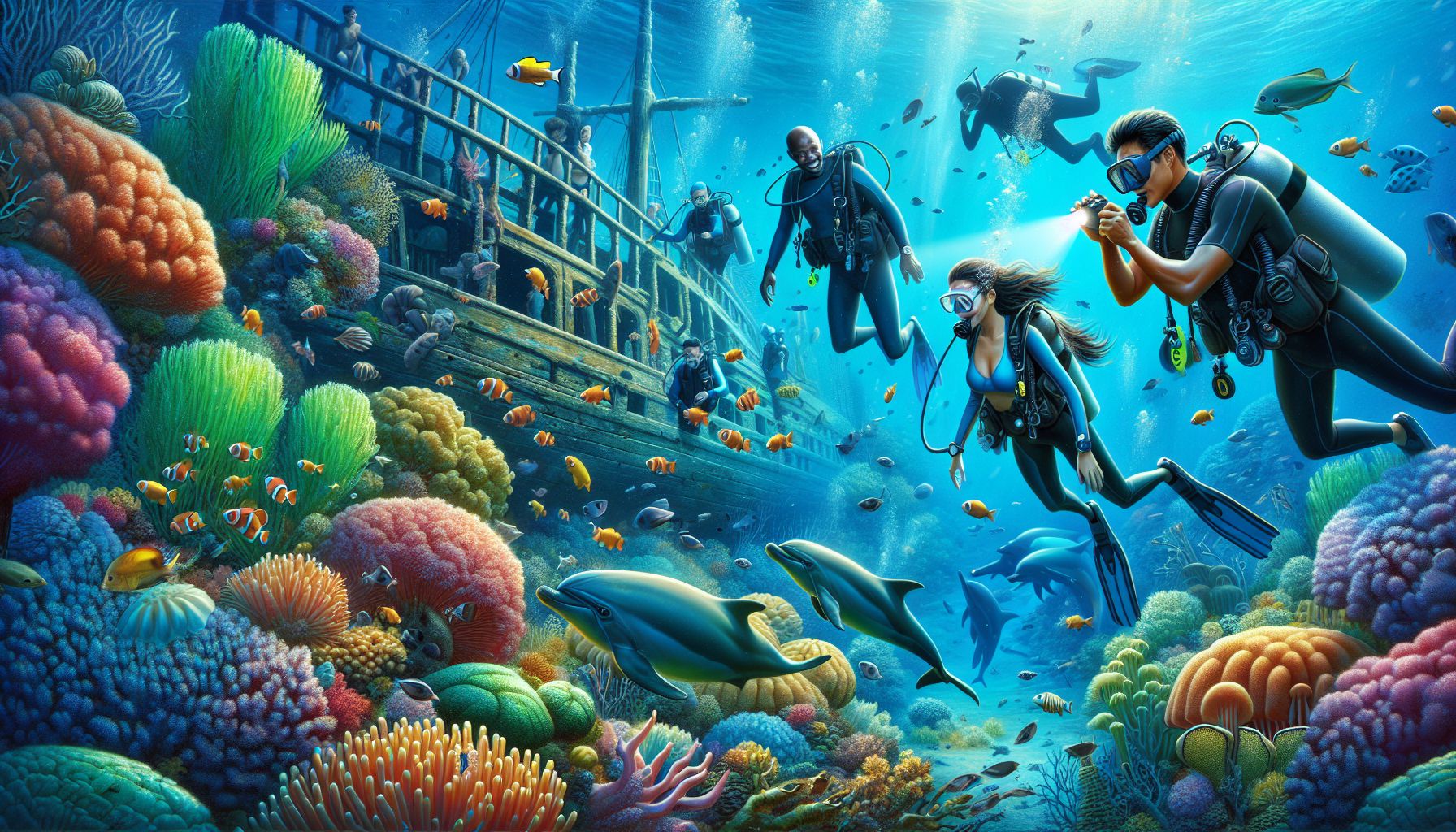Scuba diving is more than a sport or a hobby; it’s a window to a different world, to depths that remain largely untouched by human presence, and to encounters with life forms so vivid and varied that they seem conjured from imagination. It’s an activity that marries the thrill of exploration with a profound sense of tranquility, a pursuit that is as much about personal discovery as it is about discovering the wonders of the deep blue. Scuba divers are the astronauts of the ocean, and every dive is a mission into the unknown.
In this article, we delve deep into the world of scuba diving to uncover its facets, from the necessary training and equipment to the breathtaking destinations and the vibrant marine life that awaits beneath the waves. Whether you’re a seasoned diver or someone considering taking the first plunge, there’s something about scuba diving that captivates the spirit of adventure in everyone.
The Basics of Scuba Diving
Before plunging into the depths, it’s crucial to understand what scuba diving involves and what it takes to become a certified diver.
What is Scuba Diving?
Scuba diving is a form of underwater diving where the diver uses a self-contained underwater breathing apparatus (scuba) to breathe underwater. Unlike snorkeling or free diving, where you depend on your lungs or surface-supplied air, scuba gear allows you to carry your own source of breathing gas, offering greater freedom to explore underwater for longer periods.
Training and Certification
To dive safely, proper training and certification from a recognized organization are mandatory. The Professional Association of Diving Instructors (PADI), the National Association of Underwater Instructors (NAUI), and the Scuba Schools International (SSI) are among the most widely recognized certifying bodies. A typical certification course includes knowledge development, confined water dives to learn basic skills, and open water dives to apply your skills and explore.
Scuba Equipment Essentials
Scuba diving requires a set of key equipment, including:
- A mask that allows clear vision underwater.
- A scuba tank filled with compressed air or an air mixture.
- A regulator to breathe from the tank.
- A buoyancy control device (BCD) to manage your buoyancy underwater.
- Fins for efficient movement through the water.
- A wetsuit or drysuit to keep your body temperature regulated.
- A weighting system to help you descend.
- Dive computers or gauges to monitor depth, time, and no-decompression limits.
Unforgettable Dive Destinations
The world is home to a myriad of scuba diving spots, each with its unique landscapes and marine life:
Great Barrier Reef, Australia
The largest coral reef system in the world, the Great Barrier Reef is a top-rated diving destination that hosts an astonishing diversity of marine life, from delicate corals to powerful sharks.
The Red Sea, Egypt
With crystal clear waters, historic wrecks like the SS Thistlegorm, and vibrant reefs, the Red Sea is a draw for divers seeking a mix of natural beauty and historical intrigue.
The Blue Hole, Belize
A massive marine sinkhole, the Blue Hole is a bucket-list spot for many divers, offering a dive into the deep blue for encounters with rare species and geological formations.
Marine Life Encounters
Scuba diving allows for close encounters with a variety of marine creatures. Popular sightings include:
- Colorful fish like clownfish, angelfish, and parrotfish.
- Corals that come in all shapes, sizes, and colors, creating underwater forests.
- Majestic rays such as manta rays and stingrays.
- Sharks, ranging from harmless reef sharks to the imposing great white shark.
- Marine mammals like dolphins and seals, which often show curiosity towards divers.
- Small critters like nudibranchs and shrimps that captivate with their intricate designs.
Conservation and Responsibility
Scuba diving also carries a responsibility towards ocean conservation. Many organizations and initiatives, such as Project AWARE, work to protect underwater environments and promote sustainable diving practices.
- Coral Reef Protection: Divers must avoid touching or disturbing corals, which are delicate and take years to grow.
- Responsible Interaction: Feeding or harassing marine life is discouraged as it can alter their natural behaviors.
- Conservation Efforts: Participating in clean-up dives and citizen science projects can contribute to the protection of aquatic ecosystems.
Final Thoughts
Scuba diving is a transformative experience that opens your eyes to the beauty and fragility of the underwater world. It’s a hobby that becomes a passion, a passion that often turns into a lifelong quest for exploration and conservation. Whether you’re marveling at the ethereal beauty of a coral reef or floating weightlessly in the vast blue, scuba diving promises a lifetime of memories and an unbreakable bond with the ocean.
Sources:
- Professional Association of Diving Instructors (PADI) – padi.com
- Project AWARE – projectaware.org
- National Oceanic and Atmospheric Administration (NOAA) – oceanservice.noaa.gov
Diving into the depths of the ocean offers a sense of peace and connection with nature unlike any other activity. It’s a journey well worth embarking on, one that will enrich your life and leave you with a deep appreciation for the marine world. Whether you’re exploring the vibrant coral reefs, witnessing the grandeur of underwater caves, or discovering the remnants of sunken ships, each dive is a story etched into the fabric of your being. Breathe in, dive deep, and let the adventure begin.
